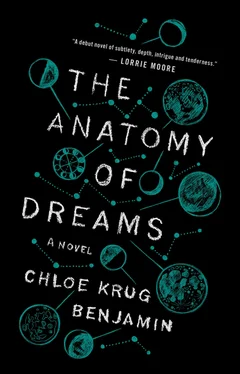I’ve been on the Vineyard for two days now. I’m staying in a little motel by the water—the most expensive one I’ve visited, but I’ve been frugal enough in the past six years to manage it. It’s located across the island from our old haunts. I wanted to keep my distance, at least until I was ready. In the morning, I have breakfast on the deck: a piece of fruit and one of the boxes of cereal I filched from the continental breakfast in Iowa City. When it gets hot, I read inside my room—I can see the ocean through the window.
I don’t know exactly what I’m waiting for. I guess I’m expecting to drop into a different state, one in which I feel meditative and unflappable. I get frustrated when I snag on things. The silvery color of the motel siding, for example. The fog and its familiar descent.
I planned my route so that I had to drive through Madison; I wanted to prove to myself I could do it. I hit the Wisconsin state line on the afternoon of July 4. I had planned to drive through the capital without stopping, but by evening, the holiday traffic had become unbearable. My muscles were rigid, and the air-conditioning in the car was less effective as the temperature rose outside. At nine o’clock, I pulled into a cul-de-sac on Rutledge and parked. I was ten minutes on foot from the old apartment in Atwood, two minutes by car. Through the window, I heard the high shrieks of the children who had gathered, with their parents, to watch the fireworks.
I unlocked the car door. I only meant to stretch my legs, but I found myself wandering down the stairs between two waterfront houses, which led to a grassy patch of land at the edge of the lake. Families sat on the grass and on the benches by the stairs, waiting.
We were bound by a congenial feeling of mutual anticipation. One of the children began to climb the fence; his father pulled him down, but not before the child pointed over the fence and hollered notice of the first explosion. It was a green shower of lights, shooting up in stalks to our right. The next one—red sparks, flaring and dissolving—came from the opposite direction. The land was so flat that we could see the fireworks of a succession of different towns. They burst one after another in all parts of the sky. The biggest explosions must have come from the closer towns, like Sun Prairie. The smaller ones followed like echoes.
We waited until the last town had sent up its final spark; the coda was a happy face, accidentally upside down. Watching the layered lights of these Wisconsin towns, many of which I’d driven through before, left me with a sore, vacant feeling. As parents collected their children and couples ambled back to the road, I found myself waiting by the fence, as if another show was soon to start or someone was coming to meet me. I could have been any other thirty-year-old woman—a well-lit apartment down the block, a partner at the stove. I look much the same as I did when I lived in Madison: the same slim, compact frame, skin beige and dotted with freckles in summertime. Two years ago, I changed my haircut, adding bangs—the feathery whim of a Berkeley hairdresser. I had hoped to be transformed, but when he spun me around to face the mirrors, it took only seconds for me to register myself. Like a child waking to a bedroom at first fuzzy and strange, the details soon sharpened into familiarity: the mole beneath my left eye, light eyebrows peeking out from behind a fuzzy shelf of hair.
When I’d spent several minutes alone and it was clear that the fireworks were over, I climbed the stairs and walked back to the car. I was already turning my mind to logistics. Accustomed as I was to working through the night, I started driving again. By the time dawn was peeling night from the landscape, returning color to the pastures and wetlands, I was in Ohio.
17. MADISON, WISCONSIN, 2005
In March, Madison shook off its crust of snow. Tree branches and grass blades shivered baldly in the early spring air; the most adventurous undergrads began to wear shorts, their legs defiantly exposed and covered in goose bumps. I lived in a vigilant state of alert. After seeing the bug on our phone line and finding Meredith’s file, I was determined to find out more. And if Gabe wouldn’t help me, I’d do it alone.
I was distant from him, as if preparing myself, as if I already knew how our story would end. He was in charge of recruiting new participants, driving through the state to post flyers at satellite campuses of the university, and I continued the file reorganization project. We needed a success, and soon: our funding for the following year was not guaranteed. But we had no more than two new participants that spring, and I think a part of us had given up. Every morning, we read the San Francisco Chronicle online on separate computers, and at night we fell asleep in our clothes.
By the end of the month, I’d finished organizing Keller’s patient files by case number. But one was missing: no matter how hard I searched, I couldn’t find number 111. I paged through each file, checking to make sure it wasn’t sandwiched inside a different folder. When I found nothing there, I turned on Keller’s computer, but everything in the ancient Dell was protected. What would Keller’s password be? I tried mills, meredith, fortbragg, sanfrancisco . No go. Next, I tried snakehollow , but the password box shuddered, as if shaking its head, and went blank again.
“Come on, Keller,” I said. I pictured a ghost Keller standing inscrutably before me, a Keller hologram—his hands woven daintily together, his slight smile impassive. “Give it up.”
Rolling my neck, I swung back to the keyboard and typed hollowsnake. The computer made a gurgling noise of happiness, and the password box sprang to one side. I laughed; could it really have been so easy? Each e-mail was now readable, each link clickable. But two hours later, I was even more alarmed: in Keller’s documents folder, I found scans of every file but 111.
I could feel a headache coming on as the fluorescent lights flickered in the ceiling. It was three in the afternoon, though you’d never have known from inside the windowless office. I’d propped the office door open with a paperweight so I could hear if someone was coming, but the hallway was silent. It would be easy to lose your mind down there, I thought; maybe the three of us already had. The top of Keller’s desk was devoid of personal items: there were only a couple of Post-its, a tiny dish of paper clips, and a Martha’s Vineyard mug (HAPPY CHAPPY!) full of identical ballpoint pens.
I spun around in his desk chair, rubbing my eyes with the heels of my hands. If Keller wanted to hide something, where would he put it? His own computer was too risky, too obvious. The same went for his hard-copy files: he would never leave a paper trail. As the chair whirled, I passed the cabinets, the propped-open door, the mini refrigerator where Gabe and I kept our dinners. On top of the refrigerator was a slender laptop, closed like a mouth, its battery light blinking green. It was Gabe’s. He often left it here overnight, especially if he decided to walk home from the lab. It was heavy, an early Dell he’d covered in band stickers—Led Zeppelin, Radiohead—and bandaged, over the years, with packing tape.
Gingerly, I opened it. Gabe had a password, too, but I knew that one without thinking: 33173, his dad’s zip code in Florida. It had been the combination for his gym lock back at Mills. In Gabe’s documents, I found electronic files that went back to patient 110: Stuart Cappleman, the dining hall worker at Mills.
It’s strange; I don’t remember my body heating up or my heart rate speeding—the marks of my old panic attacks, though they weren’t diagnosed as such for another year—when I finally found file 111. In the storm’s unblinking eye, all the training I’d done leapt to my defense: my practiced, even keel, my ability to stay calm when dealing with the most hysterical patients. I didn’t read it yet. I wanted Gabe to be with me. So I tucked the laptop in my backpack, locked the office door, and drove home.
Читать дальше












